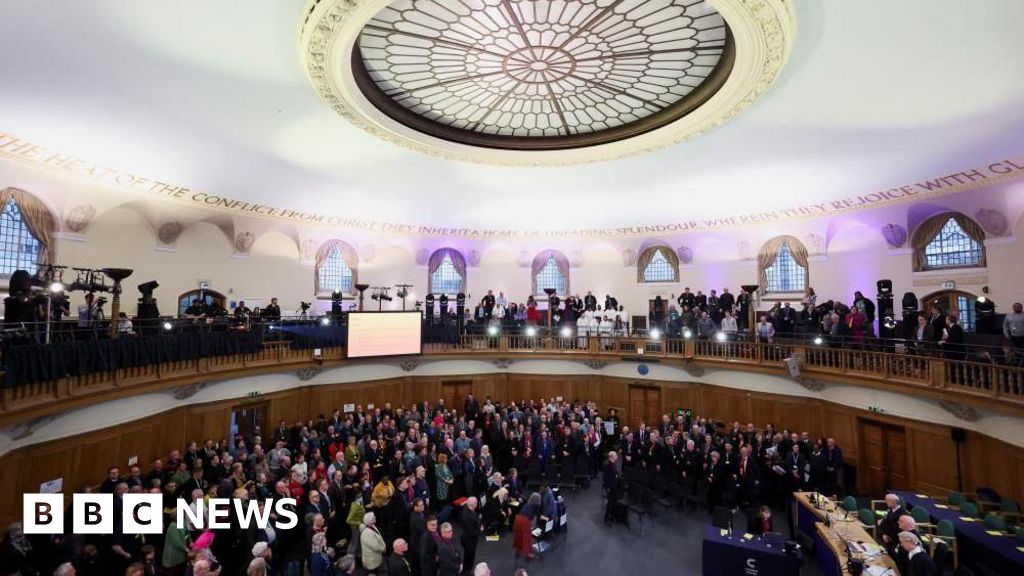
The governing assembly of the Church of England has declined to implement a completely independent safeguarding framework for addressing abuse allegations.
Instead, members of the Synod backed an alternative approach labeled as a “short-term solution,” paving the way for a potential shift to full independence in the future.
Child protection expert Professor Alexis Jay, who advocated for a fully independent system, expressed her profound disappointment with the decision, labeling it as “deeply disappointing” and “devastating for victims and survivors.”
This vote follows a tumultuous period for the Church, which has witnessed significant resignations, including that of former Archbishop of Canterbury Justin Welby, amidst scrutiny over his management of an abuse case, as well as criticism of Archbishop of York Stephen Cottrell regarding his association with yet another scandal.
Mr. Cottrell, who currently serves as the Church’s interim leader, stated his support for “independence in safeguarding” and expressed dissatisfaction that this process would occur in “two phases.”
He pledged to “fully commit” to executing the decisions made by the Synod and ensuring their realization.
The Church has faced allegations of mishandling cases of sexual and physical child abuse over the years, prompting a thorough review of its safeguarding measures.
The Synod was anticipated to vote on proposals presented by both Professor Jay, who previously chaired the national Independent Inquiry into Child Sexual Abuse, and barrister Sarah Wilkinson.
However, following a modification, the model endorsed by Professor Jay— which aimed to create a safeguarding body completely independent of the Church—was not subject to a vote, leading to the adoption of the Wilkinson proposal instead.
This decision will result in the establishment of an independent central safeguarding unit for the Church, while diocesan and cathedral safeguarding officers will still retain their existing positions.
The alternative proposal would have integrated the Church’s safeguarding officers nationwide into that independent entity, separating them from church administration.
Given the ongoing controversies and negative attention the Church has received in recent times due to major abuse revelations, adopting a more progressive model would have sent a powerful message indicating a serious commitment to enhancing safety within the Church.
Throughout the discussions, many voices in the assembly— including Mr. Cottrell, who has faced his own share of pressure—urged the Synod to capitalize on this vital opportunity.
Earlier, Professor Jay had warned that if the Church did not embrace a more independent safeguarding framework, it risked further crises regarding public safety within its communities.
Following the vote, Professor Jay remarked, “This decision will devastate victims and survivors, eroding their trust and confidence in the Church.”
She warned that it could likely alienate them even further.
Some who opposed the fully independent safeguarding proposal cited concerns over its feasibility.
Bishop of Blackburn Philip North, who introduced the amendment that narrowed the Synod’s options to a single choice, argued that the streamlined model could be rolled out more quickly.
He described the other option as “overly complex,” suggesting it could take years to implement, especially as the Church and society demand immediate changes.
Despite the implementation of these changes, which will lead to “greater independence in safeguarding,” Bishop North emphasized that a fully independent model remains a possibility for the longer term.
However, at this critical moment for the Church, the choice to commit to a more ambitious approach may have presented a stronger image than the path they ultimately selected.
Instead, the Church appears to have opted for a less assertive approach, pledging only to strive for improvement in the future.
This vote has drawn sharp criticism from advocates who demand significant reform in the Church’s response to abuse.
Lucy Duckworth from the Survivors Trust condemned the decision, stating: “This is a devastating blow, not only for the victims and survivors of clerical abuse but also for the one million children attending the 4,600 schools under the Church of England’s oversight today.”
“This reflects a shameful disregard for the enduring suffering inflicted by their clergy and employees.”
“As a survivor of clerical abuse and a campaigner, I genuinely feel let down by this decision.”
Andrew Graystone, an advocate for victims and survivors, referred to the rejection of a fully independent safeguarding system as a “painful blow for victims and survivors of church abuse,” criticizing church leaders for their “shocking arrogance.”









